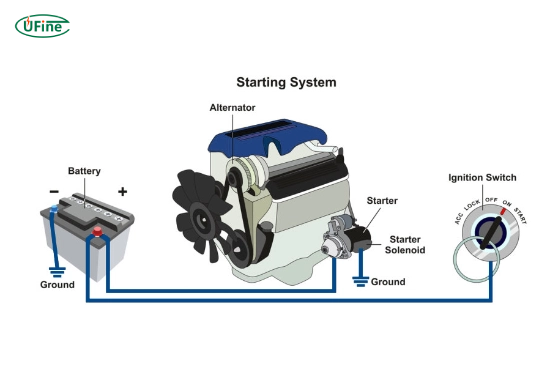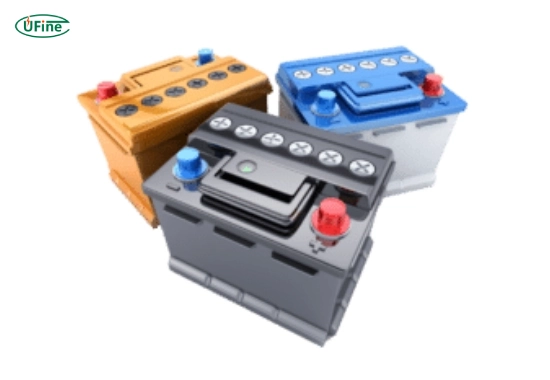
- Part 1. What is a heavy-duty battery?
- Part 2. How does a heavy-duty battery work?
- Part 3. Types of heavy-duty batteries
- Part 4. Where are heavy-duty batteries used?
- Part 5. How to choose the correct heavy-duty battery?
- Part 6. How long does a heavy-duty battery last?
- Part 7. How to maintain a heavy-duty battery?
- Part 8. Signs your heavy-duty battery needs replacement
- Part 9. Pros and cons of heavy-duty batteries
- Part 10. FAQs about heavy-duty batteries
A heavy-duty battery is a powerful, long-lasting energy source for high-demand vehicles, industrial machinery, and off-grid systems applications. Understanding heavy-duty batteries is crucial if you are considering buying one with reliability, strength, and extended performance.
This guide will explain everything you need to know before purchasing a heavy-duty battery. You will learn what it is, how it works, where it can be used, and what to consider before buying. Whether powering a truck, a solar setup, or heavy equipment, making the right choice can save you time, money, and frustration.
Part 1. What is a heavy-duty battery?
A heavy-duty battery is specially designed to handle large amounts of power and endure harsh conditions. Its stronger internal components allow it to operate reliably in demanding environments. Heavy-duty batteries are commonly used in commercial trucks, RVs, marine vessels, solar energy systems, and industrial equipment.
Unlike standard car batteries, heavy-duty batteries can deliver more energy over longer periods. They can also withstand extreme temperatures, constant vibrations, and deep discharges without losing performance.
Heavy-duty batteries are essential for systems that require consistent, high-energy output. They are not just bigger versions of regular batteries; they are purpose-built solutions for high-load applications.
Part 2. How does a heavy-duty battery work?
A heavy-duty battery works on the same basic principles as other batteries. It stores energy chemically and then releases it as electrical power when needed. However, heavy-duty batteries are constructed differently to meet more challenging demands.
These batteries usually contain thicker lead plates, denser active materials, and advanced separators. These components allow the battery to produce more current and resist damage from vibrations or frequent cycling.
Some heavy-duty batteries use Absorbed Glass Mat (AGM) technology, which holds the electrolyte in a glass mat instead of letting it flow freely. This design improves shock resistance and allows the battery to operate in various positions.
Others use Gel or Lithium-Ion technology, each with its performance advantages. Regardless of the type, all heavy-duty batteries aim to deliver reliable energy in demanding situations.
Part 3. Types of heavy-duty batteries
There are several different types of heavy-duty batteries. Understanding their differences will help you choose the right one for your application.
1. Flooded Lead Acid Batteries
These are traditional batteries where the electrolyte flows freely inside the battery case. They are affordable and widely used but require regular maintenance, such as topping off water levels and cleaning terminals.
2. AGM Batteries
AGM stands for Absorbed Glass Mat. These batteries are sealed, maintenance-free, and resistant to vibration and spillage. They are ideal for off-road vehicles, marine use, and backup power systems.
3. Gel Batteries
Gel batteries use a gel-like substance to hold the electrolyte. They are also sealed and maintenance-free. Gel batteries perform well in deep-cycle applications but are more sensitive to charging voltages and temperatures.
4. Lithium-Ion Batteries
Lithium-ion heavy-duty batteries are lightweight, fast-charging, and have a long lifespan. They are more expensive than others but offer high efficiency and energy density. They are increasingly used in solar systems, electric vehicles, and portable power units.
Each type of heavy-duty battery has unique advantages. Choosing the right one depends on your budget, the environment in which it will be used, and your specific power requirements.
Part 4. Where are heavy-duty batteries used?
Heavy-duty batteries are used in a wide range of industries and situations. Their ability to provide reliable power under stress makes them essential in many fields.
1. Commercial Vehicles
Large trucks, buses, and delivery vans use heavy-duty batteries to start engines and power onboard electronics. These vehicles often operate in extreme conditions and need a battery.
2. Recreational Vehicles and Boats
RVs and boats use heavy-duty batteries to run appliances, lights, and inverters. These batteries must provide steady power for hours or days without recharging.
3. Construction and Agricultural Equipment
Heavy machinery, such as bulldozers, tractors, and excavators, uses heavy-duty batteries to start engines and power hydraulic systems. These machines operate in dusty, wet, and vibrating environments.
4. Off-grid Solar Systems
In solar energy systems, heavy-duty deep-cycle batteries store energy produced during the day for use at night. These batteries must handle daily charge and discharge cycles without losing capacity.
5. Backup Power Systems
Emergency power setups in homes, hospitals, and data centers use heavy-duty batteries to provide instant electricity when the grid fails. The battery must be dependable and ready at all times.
Part 5. How to choose the correct heavy-duty battery?
Choosing the right heavy-duty battery involves more than picking the biggest one available. You must match the battery to your specific needs and ensure compatibility with your system.
1. Capacity
Battery capacity is measured in amp-hours (Ah). This tells you how much energy the battery can store. Higher capacity means more energy and longer runtime.
2. Voltage
Most heavy-duty batteries come in 12V, 24V, or 48V. Check your system requirements before selecting a voltage.
3. Cold Cranking Amps (CCA)
This is important for starting engines in cold weather. A higher CCA rating means the battery can deliver more power in freezing conditions.
4. Reserve Capacity (RC)
RC tells you how long the battery can supply a steady current before going flat. It is crucial for systems that must run for long periods without charging.
5. Maintenance Requirements
Flooded batteries need regular upkeep. AGM, Gel, and Lithium batteries are maintenance-free but cost more.
6. Cycle Life
Cycle life refers to how many times the battery can be charged and discharged before it starts to degrade. Choose a battery with a high cycle life for long-term use.
Part 6. How long does a heavy-duty battery last?
A heavy-duty battery can last three to ten years. The exact lifespan depends on the type of battery, how it is used, and how well it is maintained.
Estimated Lifespans
- Flooded Lead Acid: Three to five years
- AGM: Four to seven years
- Gel: Five to eight years
- Lithium-Ion: Seven to ten years or more
Proper use and regular maintenance can significantly extend the life of your battery. To maximize your investment, avoid deep discharges, overcharging, and excessive heat exposure.
Part 7. How to maintain a heavy-duty battery?
Maintenance is key to keeping your heavy-duty battery performing at its best. Here are some tips to follow:
- Check the electrolyte level if using a flooded battery. Add distilled water if necessary.
- Clean the battery terminals regularly to prevent corrosion.
- Use a smart charger to avoid overcharging or undercharging.
- Keep the battery in a cool and dry location.
- Test the battery voltage periodically to ensure it is holding a charge.
- Secure the battery properly to avoid vibration damage.
Following these steps can help your battery last longer and perform more reliably.
Part 8. Signs your heavy-duty battery needs replacement
There are several warning signs that your battery may be reaching the end of its life:
- Slow engine cranking
- Dim lights or weak power in appliances
- Swollen or leaking battery case
- Unusual smells like rotten eggs
- Frequent need for jump-starts
- Warning lights on the dashboard
If you notice these symptoms, testing or replacing the battery may be necessary. Do not ignore these signs; a failing battery can leave you stranded.
Part 9. Pros and cons of heavy-duty batteries
Pros
- High power output for demanding applications
- Long lifespan when properly maintained
- Can withstand extreme conditions
- Available in various types for different uses
- Reliable performance even under stress
Cons
- Higher upfront cost compared to standard batteries
- Some types require regular maintenance
- Heavier and larger
- Charging systems may need to be upgraded for compatibility
Understanding these advantages and limitations will help you decide whether a heavy-duty battery suits your application.
Part 10. FAQs about heavy-duty batteries
What is the difference between a heavy-duty battery and a regular battery?
A heavy-duty battery is built with stronger internal components and higher capacity. It handles more power, deeper discharges, and more challenging operating conditions than a regular battery.
Can I use a heavy-duty battery in a regular car?
You can use a heavy-duty battery in a regular vehicle if it fits and matches the electrical system. However, it may be overkill unless your car has high power demands or is used in extreme conditions.
Which type of heavy-duty battery is best?
The best type depends on your needs. AGM batteries are great for most uses due to their durability and low maintenance. Lithium batteries are ideal for long-term, high-efficiency setups but have a higher price tag.
How can I extend the life of my heavy-duty battery?
Avoid deep discharges, keep the battery charged, store it in cool conditions, and perform regular maintenance. Use a smart charger that prevents overcharging.
Are heavy-duty batteries environmentally friendly?
Some types, like Lithium-Ion batteries, are more eco-friendly and recyclable. Others, like lead-acid batteries, require proper disposal due to their toxic components. Always recycle batteries through certified centers.
Related Tags:
More Articles

What are Watts and Watt Hours in Battery?
Understand watt vs watt-hour in batteries, how to calculate battery watt hours, and what Wh means for car batteries, devices, and energy storage.
A Complete Guide to the Best Batteries for Flashlights
Compare the best batteries for flashlights, including AA, AAA, 18650, 21700, CR123A. See which battery offers the best brightness, runtime, and reliability.
How Long Do Rechargeable AA Batteries Last?
How long do rechargeable AA batteries last? Compare NiMH and lithium AA lifespan, recharge cycles, key factors, and performance vs alkaline batteries.
How Much Current Can a 9V Battery Really Supply?
Discover how many amps a 9V battery can supply, its actual current output, discharge rate, and capacity for alkaline, lithium, and rechargeable 9V batteries.
12V STD vs 12V AGM: Meaning, Differences, and Which Is Better
Understand what STD and AGM batteries mean, their key differences, and which 12V battery fits your needs best in 2026.




